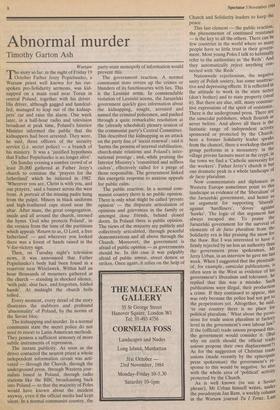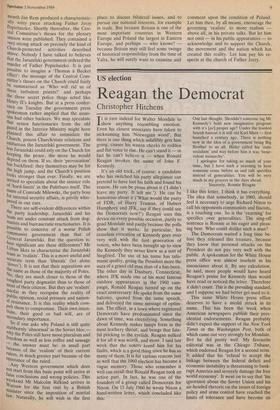Abnormal murder
Timothy Garton Ash
Warsaw The story so far: in the night of Friday 19 October Father Jerzy Popieluszko, a Warsaw priest well known for his out- spoken pro-Solidarity sermons, was kid- napped on a main road near Torun in central Poland, together with his driver. His driver, although gagged and handcuf- fed, managed to leap out of the kidnap- pers' car and raise the alarm. One week later, in a half-hour radio and television broadcast at peak time, Poland's Interior Minister informed the public that the kidnappers had been arrested. They were, he said, three officers of the security service (i.e. secret police) — a branch of his ministry. It was a 'justified hypothesis that Father Popieluszko is no longer alive'.
On Sunday evening a sombre crowd of at least 20,000 gathered at Father Jerzy's church to continue the 'prayers for the fatherland' which he initiated in 1982. `Wherever you are, Christ is with you, and our prayers,' said a banner across the west front. A portrait of the missing padre hung from the pulpit. Miners in black uniforms and high-feathered caps stood near the altar. After mass, the great congregation, inside and all around the church, intoned the hymn 'God who protects Poland', in the version from the time of the partitions which appeals 'Return to us, 0 Lord, a free fatherland' — and wherever you looked there was a forest of hands raised in the V-for-victory sign.
Then, on Tuesday night's television news, it was announced that Father Popieluszko's body had been found in a reservoir near Wloclawek. Within half an hour thousands of mourners gathered at the church — standing in shocked silence, 'with pale, shut face, and forgotten, folded hands'. At midnight the church bells tolled.
Every moment, every detail of the story illustrates the stubborn and profound 'abnormality' of Poland, by the norms of the Soviet bloc:
The kidnapping and murder. In a normal communist state the secret police do not need to resort to Latin American methods. They possess a sufficient armoury of more subtle instruments of repression.
The instant publicity. As soon as the driver contacted the nearest priest a whole independent information circuit was acti- vated — through the Church, through the underground press, through Western jour- nalists based in Poland, through radio stations like the BBC broadcasting back into Poland — so that the majority of Poles would have known about the incident anyway, even if the official media had kept silent. In a normal communist country, the party-state monopoly of information would prevent this.
The government reaction. A normal communist state covers up the crimes or blunders of its functionaries with lies. This is the Leninist norm. In commendable violation of Leninist norms, the Jaruzelski government quickly gave information about the kidnapping, sought, arrested and named the criminal policemen, and pushed through a quite remarkable resolution at the (already scheduled) plenary session of the communist party's Central Committee. This described the kidnapping as an attack on the party line of 'social renewal'; said it `harms the process of internal stabilisation, church-state relations and Poland's inter- national prestige'; and, while praising the Interior Ministry's 'committed and selfless cadres', effectively called for a purge of those responsible. The government linked this energetic response to anxious appeals for public calm.
The public reaction. In a normal com- munist country there is no public opinion. There is only what might be called 'private opinion' — the disparate articulation of opinions and grievances in the family or amongst close friends, behind closed doors. In Poland there is public opinion. The views of the majority are publicly and collectively articulated, through peaceful demonstrations and all above through the Church. Moreover, the government is afraid of public opinion — as governments should be. In this case it was palpably afraid of public unrest, street demos or strikes. Once again, it relies on the help of Church and Solidarity leaders to keep the peace.
This last element — the public reaction, the phenomenon of continued resistance is the key to all the others. There can be few countries in the world where so many people have so little trust in their govern- ment. Most young Poles I talk to habitually refer to the authorities as 'the Reds'. And they automatically ,reject anything con- nected with 'the Reds'.
Nationwide rejectionism, the negative unity of Polish society, has some unattrac- tive and depressing effects. It is reflected in the attitude to work in the state sector (don't bother) and to state property (steal it). But there are also, still, many construc- tive expressions of the spirit of resistance. There is the underground press. There are the samizdat publishers, which flourish as never before. And above all there is the fantastic range of independent activity sponsored or protected by the Church: here a former Solidarity leader speaks from the chancel, there a workshop theatre group performs in a monastery: in the village private farmers meet in the crypt, in the town we find a 'Catholic university for the workers'. Father Jerzy's church is but one dramatic peak in a whole landscape of de facto pluralism. Now commentators and diplomats in Western Europe sometimes point to this landscape as evidence of the 'liberalism' of the Jaruzelski government, and hence as, an argument for supporting `liberals' against 'hardliners', 'doves' against 'hawks'. The logic of this argument has always escaped me. To praise the Jaruzelski government for the survival of elements of de facto pluralism from the Solidarity era is like praising the snow for the thaw. But I was interested to have it firmly rejected by no less an authority than the government press spokesman, Mr Jerzy Urban, in an interview he gave me last week. When I suggested that the plenitude of, for example, samizdat publications, Is often seen in the West as evidence of his government's liberalism and tolerance, he replied that this was a mistake. Such publications were illegal, their production a crime. If they continued to appear, this was only because the police had not got to the perpetrators yet. Altogether, he said, 'in our country there is no place for political pluralism.' What about the provi- sions for trade union pluralism at factory level in the government's own labour law? If the (official) trade unions proposed this, the government would consider it. (But why on earth should the official trade unions propose their own displacement?) As for the suggestion of Christian trade unions (made recently by the episcopate press spokesman) the government's re- sponse to this would be negative. So also with the whole area of 'political' activity protected by the Church. As is well known (to use a Soviet phrase), Mr Urban himself writes, under the pseudonym Jan Rem, a weekly column in the Warsaw journal Tu I Teraz. Last month Jan Rem produced a characteristic- ally witty piece attacking Father Jerzy Popieluszko. Shortly thereafter, the Cen- tral Committee's theses for the plenary session were published. They contained a very strong attack on precisely the kind of Church-protected activities described above. Nobody I have talked to believes that the Jaruzelski government ordered the murder of Father Popieluszko. It is just Possible to imagine a 'Thomas a Becket effect': the message of the Central Com- mittee's theses on the Church could fairly be summarised as 'Who will rid us of these turbulent priests?' and perhaps the three secret police thugs acted like Henry II's knights. But at a press confer- ence on Tuesday the government press spokesman rather implied that the assas- sins had other backers. We may speculate that senior functionaries from the old guard in the Interior Ministry might have Planned this affair to intimidate the Church, poison Church/state relations and embarrass the Jaruzelski government. The less Jaruzelski could rely on the Church for keeping the peace, the more he would depend on them. If so, their 'provocation' has backfired: they themselves may be for the high jump, and the Church's position !cooks stronger than ever. Finally, we are Invited to speculate about the sinister role of 'hard-liners' in the Politburo itself. The name of Comrade Milewski, the party boss for internal security affairs, is privily whis- pered in our ears.
There are self-evident differences within the party leadership. Jaruzelski and his team are under constant attack from dog- matists and bureaucratic reactionaries. It is Possible to conceive of a worse Polish communist government than that of General Jaruzelski. But the question is: ,how significant are these differences? Mr Urban likes to characterise the Jaruzelski Learn as 'realists'. This is a more useful and accurate term than 'liberals' (let alone doves'). It is not that their aspirations are the same as those of the majority of Poles. 1\10, they are much closer to those of the toughest party dogmatist than to those of most of their citizens. But they are 'realists' Insofar as they recognise the reality of Public opinion, social pressure and nation- al resistance. It is this reality which com- pels them to compromise. Their own inten- tions, their good or bad will, are of secondary importance. So if one asks why Poland is still quite stubbornly 'abnormal' in the Soviet bloc,— Why the Poles still have more pluralism and freedom as well as less coffee and sausage the answer must be: in small part because of the 'realism' of their current rulers, in much greater part because of the resistance of the ruled.
Any Western government which does not start from this basic point will arrive at false conclusions and wrong policies. This weekend Mr Malcolm Rifkind arrives in Warsaw for the first visit by a British Minister since the imposition of martial law. Naturally, he will wish in the first
place to discuss bilateral issues, and to pursue our national interests, for example in trade. But because Britain is one of the most important countries in Western Europe and Poland the largest in Eastern Europe, and perhaps — who knows? because Britain may still feel some twinge of historical responsibility from the time of Yalta, he will surely want to examine and
comment upon the condition of Poland. Let him then, by all means, encourage the governing 'realists' to more realism above all, in his private talks. But let him not omit — in his public appearances — to acknowledge and to support the Church, the movement and the nation which has created this reality. Let him pay his re- spects at the church of Father Jerzy.











































 Previous page
Previous page